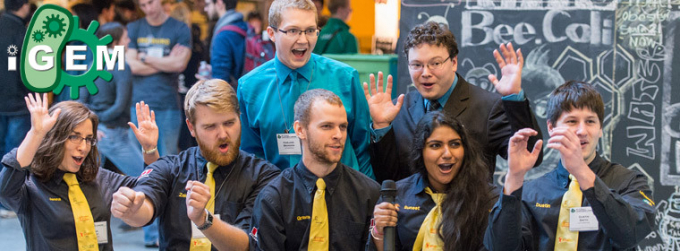
2013 iGem teams: Entrepreneurs Harland Brandon and Isaac Ward (l-r, top row); North America Overgrad Winners Jenna Friedt, Zak Stinson, Graeme Glaister, Suneet Khary and Dustin Smith (l-r, bottom row)
About iGEM
What is the iGEM Competition?
The International Genetically Engineered Machine competition (iGEM) is the premiere undergraduate Synthetic Biology competition. Student teams are given a kit of biological parts at the beginning of the summer from the Registry of Standard Biological Parts. Working at their own schools over the summer, they use these parts and new parts of their own design to build biological systems and operate them in living cells. This project design and competition format is an exceptionally motivating and effective teaching method. In 2011 iGEM expanded to include a High School Division and an Entrepreneurship Division in 2012.
iGEM Competition History
iGEM began in January of 2003 with a month-long course at MIT during their Independent Activities Period (IAP). The students designed biological systems to make cells blink. This design course grew to a summer competition with 5 teams in 2004, 13 teams in 2005 - the first year that the competition grew internationally - 32 teams in 2006, 54 teams in 2007, 84 teams in 2008, 112 teams in 2009, 130 teams in 2010, 165 teams in 2011, and 245 teams in 2012 and 2013. Projects range from a rainbow of pigmented bacteria, to banana and wintergreen smelling bacteria, an arsenic biosensor, Bactoblood, and buoyant bacteria.
The iGEM Foundation
The International Genetically Engineered Machine (iGEM) Foundation is dedicated to education and competition, advancement of synthetic biology, and the development of open community and collaboration. In 2012, iGEM spun out of MIT and became an independent nonprofit organization located in Cambridge, Massachusetts, USA. The iGEM Foundation fosters scientific research and education through organizing and operating the iGEM Competition, the premier student synthetic biology competition. It also fosters scientific research and education by establishing and operating the Registry of Standard Biological Parts, a community collection of biological components. The organization promotes the advancement of science and education by developing an open community of students and practitioners in schools, laboratories, research institutes, and industry. The iGEM community has a long history of involving students and the public in the development of the new field of synthetic biology.
(from igem.org/about)